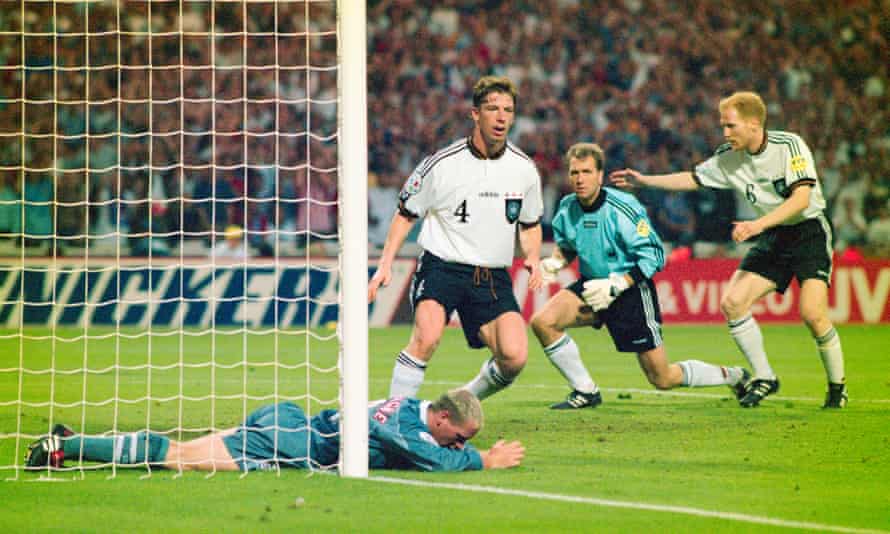Let’s try a quick thought exercise. Team A, ranked No 4 in the world, comfortably topped its group and is on a run of nine games without defeat, with a defence that has conceded just five goals in its last 17 matches. Team B, ranked No 12, scraped through its group with four points and wildly inconsistent performances, hasn’t kept a clean sheet in six games and lost 6-0 as recently as November. Team A is playing at home. Who do you think should start as favourites?
Treat this game as a blind taste test, with the labels and the history and the emotional baggage stripped away, and England v Germany feels like a simple enough proposition. It’s by no means a foregone conclusion, but all things being equal England should probably win, especially with home advantage. But of course tournament football, especially at international level, is not played in a vacuum. Mythologies and mentalities matter. Imponderables impinge. History – well, you can embrace it or you can ignore it, but you can’t erase it. It’s there, staring you down, whether you want to look at it or not.
You could sense those old ley lines pulsing from the moment the final whistle blew in Munich on Wednesday night, setting Germany and England on their collision course. “It’s coming home,” the official German national team account tweeted after the last-16 draw was complete. “Wembley, there’s almost no better game,” Joshua Kimmich gushed. Manuel Neuer agreed: “Wembley suits us. It’s a completely different game. You’ve seen it when we play against stronger teams.”
There was an instinctive bullishness here, a supreme confidence entirely out of step with anything they have been producing on the pitch. If a certain part of the English footballing psyche still regards Germany with trepidation, then perhaps the same is true in the opposite direction. Somehow, you could feel the knotted angst of a fraught group stage instantly beginning to unclench. Lads, it’s England. Everything’s going to be fine.
There have been a lot of words written and spoken in the last few days about England’s relationship towards Germany: the plaintive wailing and self-reproachment, the broad consensus that Phil Foden and Raheem Sterling are probably not going to be scarred by the 1970 World Cup quarter-final and that Pizza Hut advert featuring Gareth Southgate and Stuart Pearce. This is inarguable. But it doesn’t really tell us very much. Put it like this: the history of England v Germany – Gazza, Southgate, Lampard, Basil Fawlty – may not be strictly relevant here. But separately, the history of England and the history of Germany certainly are, because they speak to a key element in international team sport: self-image.

On the English side, it manifests itself most glaringly in the maudlin mood music that surrounds any national team deemed insufficiently dominant. However hermetically sealed this squad might like to think it is from the conversation around it, these things still have a habit of seeping through: whether it is through the questions they get asked, the discourse they’re exposed to on social media, even the increasing edginess of a quarter-full Wembley Stadium as a penalty shoot-out approaches.
For Germany, history rears its head in more direct and obvious ways. “The decisive factor is that we not only have class, we have a mentality,” Thomas Müller said in an interview with Bild before the tournament. “These players know how to win, they’ve proven it. We’re not just anyone. We feel like we can bring it to the field.” |He cited the examples of Jürgen Klopp, Hansi Flick and Thomas Tuchel – the last three coaches to win the Champions League, two of them with English clubs – as evidence that “the German mentality can be successful”.
Clearly this is the exact opposite of an inferiority complex: the idea that football games are won not just by shooting and tactics but by some essential insoluble quality we may as well call Germanness, something in the water that simply renders them winners. It’s a trope you find again and again. “Once Germany smells blood they are as good as anyone at the mental side of it,” Dietmar Hamann said in an interview with the Telegraph last week. “When they get to a semi-final the mood is, ‘We won’t get beat.’”
This might be a good time to point out that Germany have lost four of their last six semi-finals.
The Fiver: sign up and get our daily football email.
Perhaps there is an element of self-fulfilling prophesy to all this. Perhaps it’s simply a neat mental trick, a way of infusing every generation of German players with the mindset of its predecessors. Yet very little of this seems to tally with the hard evidence. A team in full command of its emotions probably isn’t the kind that loses 6-0 to Spain and 2-1 to North Macedonia. A team hard-wired for success probably shouldn’t be needing a deflected 84th-minute equaliser from Leon Goretzka to bungle into the knockout stages.
It’s easy enough to claim that these two teams are unburdened by history. But what happens if England go an early goal down, if Germany enjoy a long spell of possession, if England miss a succession of chances, if the game winds up going to extra time and penalties? How will that feel? Confidence, belief, perseverance, clarity of thought: these are real components of success, and often at the mercy of unknowable forces. England are perfectly capable of winning this game on the pitch. But their first and most important task is not to lose it in their heads first.
from Football | The Guardian https://ift.tt/3A78sDN
via IFTTT

No Comment